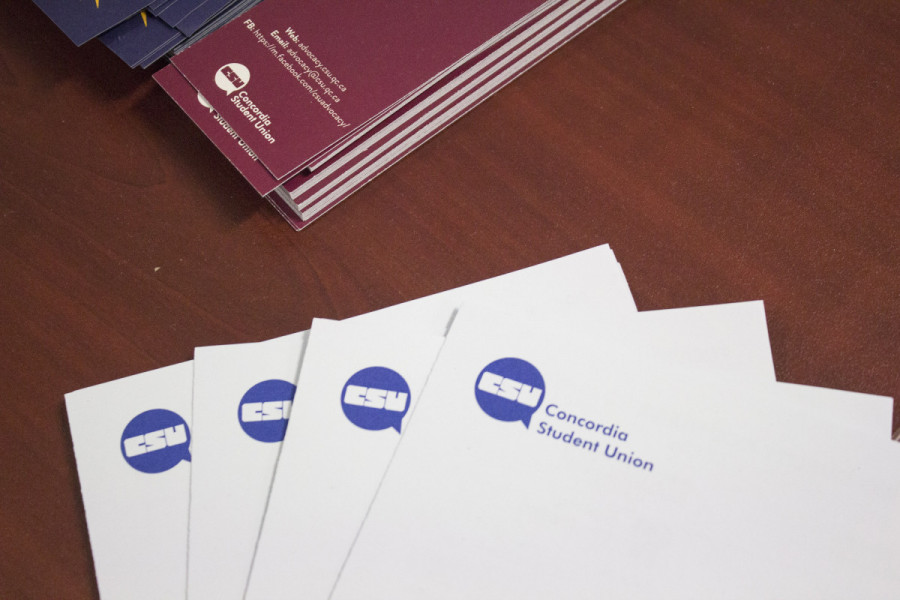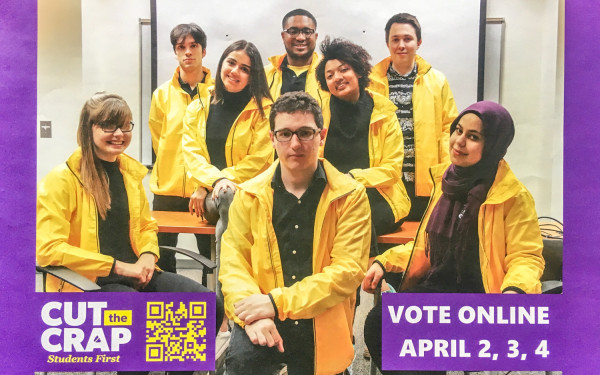CSU Council Candidate Disqualified Due to Pending Faculty Transfer
General Coordinator Accused of Misusing Position to Influence Elections
After Harvin Hilaire was elected as a John Molson School of Business councillor in the Concordia Student Union election, he was informed by chief electoral officer Florian Prual he was being evaluated by the Judicial Board for not being a JMSB student.
Hilaire garnered 129 votes, second most amongst candidates vying to become JMSB councillors.
This past year, Hilaire was a part of the Arts and Science faculty. He applied to transfer into JMSB and received his acceptance to business technology management on March 11. Anticipating his acceptance, he completed the JMSB councillor nomination form due on March 6.
“When I found out that Harvin was running for JMSB, I was surprised,” said Patrick Quinn, academic and advocacy coordinator. He knew Hilaire was previously an Arts and Science student and looked up his name in the list of undergraduate students with General Coordinator Christopher Kalafatidis. The list showed Hilaire was still in Arts and Science.
However, it’s the job of the CEO to consult the list of undergraduate students to verify if nominees are eligible to run in a CSU election.
According to Prual, Kalafatidis used the list to check the status of those running for council—which he was running for as well under Arts and Science.
External and Mobilization Coordinator Isaiah Joyner, who won his bid to become the next general coordinator of the CSU effective June 1, considers this inappropriate behaviour because executives should try to be as hands-off as possible during elections.
In an open letter published on April 5, Quinn and Kalafatidis advised students to vote against Joyner, their former slatemate. They cited Joyner’s rejection of long-standing Cut the Crap positions as reason to vote against him, amongst other things.
CSU executives have access to the list of undergraduates to verify student status, according to Joyner. “For example, I’m using it to verify people are students before I give them an emergency bursary,” he explained.
If the general coordinator was looking up names while campaigning for council, “that would be a gross violation of the Standing Regulations,” said previous general coordinator Sophie Hough-Martin. “[The general coordinator] intentionally stays out of it, because that would be an abuse of office.”
“Chris’s girlfriend [Danielle Vandolder-Beaudin] and some of his friends were JMSB councillor candidates. I’m sure you can see the picture already,” Prual said. “You know how, in political movies, as long as you have relationships you’re good? It works exactly the same way, they protect each other and sink the rest.”
“The general coordinator is not allowed to use his power to alter the elections in any way, and he has done so,” said Hilaire.
But Kalafatidis argues he only looked up candidates because the CEO wasn’t taking initiative.
“The general coordinator is not allowed to use his power to alter the elections in any way, and he has done so.” —Harvin Hilaire
“Prual has a history of mistakes,” Kalafatidis said. He was referring to the disqualification of Cut the Crap after the 2019 general elections, a decision that was overturned in seven of eight cases. The only disqualification to stand was that of Vandolder-Beaudin, who ran in this election in the same race as Hilaire to become a JMSB councillor. She was one of seven elected.
“The only benefit to be gained by anyone, including myself, was the fair election that all candidates deserve,” said Kalafatidis. “It is a shame that Prual did not take my concerns seriously. Prual had the opportunity to correct the error and did not take it.”
When Hilaire’s situation was brought to Prual’s attention by Kalafatidis on March 10, Hilaire provided his acceptance letter proving he was a JMSB student on March 11.
Prual thought the Standing Regulations failed to account for this situation and let him run. Hilaire wouldn’t have been able to re-apply as an Arts and Science councillor because the nomination deadline already passed.
“The rules state you have to be in the faculty you want to represent in order to run,” Quinn said. “This is because there is no guarantee that someone will be in the faculty they want to represent in the future.”
“In an acceptance letter, it clearly states when you start your program and if your offer is conditional,” Quinn explained. “In Harvin’s case, his acceptance letter showed he would be in JMSB starting in September 2020.” Because of this, Hilaire was still listed under Arts and Science during nominations.
“This case [was] too complex, it needed careful consideration,” Prual said. “Then the pandemic shifted things further, so I forgot about it.”
When Hilaire wasn’t removed from the JMSB ballot, Quinn filed a complaint against him to the Judicial Board on April 4.
According to Prual, Kalafatidis also played a large role in the complaint’s creation. Kalafatidis disagrees, because while he played a role in collecting information, he didn’t help Quinn in filing the complaint.
“Given that the CEO blatantly disregarded the rules and refused to take corrective action, I filed a complaint with the Judicial Board a day before voting started,” said Quinn. “The ruling came on the Monday after the results were announced.”
On April 14, the Judicial Board disqualified Hilaire and Lauren Perozek was elected in his place. Hilaire said the process was done without his knowledge, leaving him unable to defend himself.
According to Hilaire, the Judicial Board made the decision assuming he was not able to cast a ballot in the election as a JMSB student. “But they have zero evidence of this as all election results are supposed to remain confidential,” he said.
When policy issues emerge during the electoral process making it impossible for students to get involved, we should look to adapt the policy rather than turn them away, said Joyner.






_600_375_90_s_c1.jpg)
_600_375_90_s_c1.jpg)